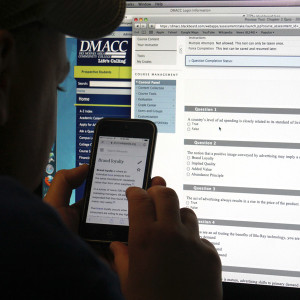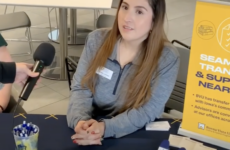 One could equate speeding to cheating on several levels: It is clearly something that you are not supposed to do, yet some still will do it.
One could equate speeding to cheating on several levels: It is clearly something that you are not supposed to do, yet some still will do it.
Those who do try to avoid any and all enforcement. There are regulations in place to prevent us from doing so, and yet, everyone was 16 once.
So what happens when the enforcement, or perception of enforcement, is removed?
This is the question posed by distance learning online.
Classroom deterrents are fairly straightforward with a professor present. An online course, devoid of these and other deterrents, may breed a cheating heart.
Distance learning, with all its perks, is growing exponentially each year on a national level. According to a 2014 report by the Online Learning Consortium, every year since 2003 “the number of students taking at least one online course has grown at a rate greater than that of the overall higher education.”
DMACC has 13 percent of its students currently enrolled in online-only courses and 20 percent in hybrid distance and classroom learning, according to Joe DeHart, Executive Director of Institutional Effectiveness and Assistant to the President.
The advent of DMACC On Demand will likely see even more adults taking the leap into the online world.
This feature allows one to ration out the class over a period of five to 15 weeks, depending on you the student and time available. With six different start dates per year, it could prove a convenient alternative to classroom learning.
It could also lead into temptation.
“In some respects, we’re asking for trouble if we’re only asking students to regurgitate generic information,” said Andrew Neuendorf, District Chair of Humanities and Associate Professor of English and Literature.
Neuendorf has been teaching online classes for nearly a decade, the last seven with DMACC, corresponded over email.
“In my opinion, the best deterrent for paper assignments is to write specific, complex assignments that require originality. Also, the more specific criteria you can build into the assignment…the less likely a student is going to be able to find a pre-made assignment that fits. If a student has struggled to string a sentence together all semester and then suddenly submits a paper that looks like a PhD dissertation, you have a problem.”
One way to combat this is to proctor high-stakes exams, which means a supervised testing site, online or physical. Currently, there is no mandated option in place.
“We’re not overly sold on any of these proctor (options),” Mark Steffen, Executive Director of Program Development said.
“It costs the students money when they have to go take the test. We are looking at something that we can purchase, district wide, and absorb the cost so we don’t have to charge the students.”
There are, however, resources for instructors to use for aids. DMACC makes use of ProctorU and LockDown Browser, software designed to watch or prevent computer functions, respectively. SafeAssign by Blackboard and Turnitin are plagiarism sites to check a student’s work against international databases.
Joe Raineri, eLearning App Support Analyst, has even had students try to circumvent traditional methods and cheat via tech support.
Unfortunately for them, Blackboard logs nearly everything. This includes sign-in, navigation, and duration information.
“Sometimes you lose your Internet connection while you are taking a test and nothing saved,” said Raineri, offering advice for those truly plagued with issues.
“Always go back in and check to see if it worked and was submitted. Call Tech support if there was an issue so we can tell the instructor that when it happened, they (the student) let us know immediately.”
Jim Loos, Music Program Chair and Internet Music Appreciation coordinator, is also constantly on the lookout for instances of cheating online.
He sets up testing via Blackboard with strict time limits to minimize the potential for cheating.
Any instance “is dealt with between the instructor and the student,” with punishment determined case by case.
This punishment could lead to a more serious reprimand. Initially, once suspected, a student will be confronted and made aware of the situation. They could be given a failing grade for the assignment, made to retake/recomplete under closer watch, or, due to severity, dropped from the class or expelled from DMACC altogether. If wrongfully accused, there are a series of steps a student can take to correct this action as outlined in the code of conduct.
The Academic Misconduct Policy states, “If the student is suspended from classes within the established drop period, then the student may choose to withdraw from his/her courses. The only exception would be if the student has been found responsible for Academic Misconduct and has been given the sanction of a failing grade for the course; the student is then not permitted to withdraw from that particular course.”
Four-year institutions, certain employers, licensing boards, and medical or law schools are among those who screen for these violations.
One may even run into trouble at the end of the line when trying to get licensed after years of a misconduct record flying under the radar.
DMACC Judicial Officer Debbie McKittrick offered up an instance where a student repeatedly failed the same class three times for plagiarism.
Upon review, they found that the student was just unaware of the exact definition. The school has set up many online resources to combat this lack of knowledge. One such resource is found at https://www.dmacc.edu/learntocite/.
The DMACC library lists plagiarism in the following ways:
1.Buying, stealing or borrowing a paper.
2.Hiring or asking someone to complete coursework or take a test.
3.Copying from another source without citing (intentionally or by accident).
4.Cutting or pasting text or graphics from Internet sources without proper citation.
5.Using the source too closely when paraphrasing without proper citation.
Ultimately, the choice lies within the student. On what deters students, McKittrick wrote in an email, “Hopefully their own ethics, morals and their innate sense of right and wrong. My hope for students is that they come to college with these characteristics intact … But if that is not the case, they should know that … once that violation is recorded in my office, it remains here for seven years.”
An expulsion or suspension will actually demand that the record be kept forever.





Comments